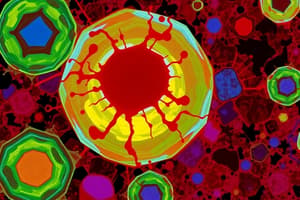Podcast
Questions and Answers
What does pathophysiology deal with?
What does pathophysiology deal with?
- The study of structural and functional changes in cells, tissues, and organs of the body
- The function of the human body
- The effect of changes in cells or organs that occur with diseases on total body function (correct)
- The physiology of altered health
How is health defined?
How is health defined?
- An interruption, cessation, or disorder in the function of the body organ or system
- The presence of mental well-being
- A state of complete physical, mental, and social well-being (correct)
- The absence of disease and infirmity
What is disease characterized by?
What is disease characterized by?
- An identifiable group of signs and symptoms or consistent anatomic alteration (correct)
- A recognized etiologic agent
- An interruption, cessation, or disorder in the function of the body organ or system
- The absence of mental well-being
What does etiology refer to in the disease process?
What does etiology refer to in the disease process?
What does pathology deal with?
What does pathology deal with?
Which type of hypertrophy occurs as a result of disease condition?
Which type of hypertrophy occurs as a result of disease condition?
What is the result of hypertrophy?
What is the result of hypertrophy?
In which type of cells does hypertrophy occur?
In which type of cells does hypertrophy occur?
What is an example of physiologic hypertrophy?
What is an example of physiologic hypertrophy?
Which type of adaptation is a response to stress that allows cells to modulate their structure and function to escape injury?
Which type of adaptation is a response to stress that allows cells to modulate their structure and function to escape injury?
Flashcards are hidden until you start studying
Study Notes
Pathophysiology and Health
- Pathophysiology deals with the functional changes occurring in the body as a result of a disease or medical condition.
- Health is defined as a state of complete physical, mental, and social well-being, not merely the absence of disease.
Characteristics and Etiology of Disease
- Disease is characterized by a specific set of signs and symptoms that interfere with normal bodily functions.
- Etiology refers to the cause or origin of a disease, including genetic, environmental, and lifestyle factors.
Pathology
- Pathology is the study of the nature and causes of diseases, focusing on the structural and functional changes they produce in tissues and organs.
Hypertrophy
- Pathological hypertrophy occurs as a result of disease conditions, such as heart disease, where the heart muscle enlarges.
- The result of hypertrophy is an increase in cell size, which can enhance the organ's ability to perform its function initially, but may lead to dysfunction over time.
- Hypertrophy occurs in various types of cells, particularly in muscle cells, including cardiac and skeletal muscle.
Types of Hypertrophy
- An example of physiologic hypertrophy is the enlargement of skeletal muscles in response to regular exercise or weight training.
- Adaptation to stress that allows cells to modulate their structure and function to escape injury is known as hypertrophic adaptation.
Studying That Suits You
Use AI to generate personalized quizzes and flashcards to suit your learning preferences.



